Every dog owner knows the struggle of dealing with a stinky dog. Whether it's from rolling in something unpleasant, a lack of grooming, or an underlying health issue, a smelly dog can be a challenge to manage. But fear not! With the right approach, you can keep your canine companion smelling fresh and clean. This comprehensive guide will walk you through everything you need to know about how to clean a stinky dog.
Understanding the Causes of Dog Odor
Before diving into cleaning methods, it's essential to understand what might be causing your dog's odor. Common causes include:
- Poor Hygiene: Dogs that aren't bathed regularly can develop a strong odor.
- Skin Infections: Bacterial or fungal infections can cause unpleasant smells.
- Ear Infections: Dogs with floppy ears are prone to ear infections, which can produce a foul odor.
- Dental Issues: Bad breath can be a sign of dental problems.
- Anal Gland Issues: Impacted or infected anal glands can cause a strong, fishy smell.
- Rolling in Unpleasant Substances: Dogs often roll in things like feces or dead animals, which can leave a lingering odor.
Step-by-Step Guide to Cleaning a Stinky Dog
Now that you know the potential causes, let's get into the steps to clean your stinky dog effectively.
1. Gather Your Supplies
Before you start, make sure you have all the necessary supplies:
- Dog shampoo
- Towels
- Brush or comb
- Ear cleaner
- Toothbrush and dog toothpaste
- Gloves (optional)
2. Brush Your Dog
Start by brushing your dog to remove any loose hair, dirt, or debris. This will make the bathing process more effective and help prevent matting.
3. Check for Any Skin Issues
While brushing, check your dog's skin for any signs of irritation, redness, or infection. If you notice anything unusual, consult your veterinarian before proceeding with the bath.
4. Prepare the Bath
Fill a tub or basin with lukewarm water. Make sure the water is not too hot or too cold, as extreme temperatures can be uncomfortable for your dog.
5. Wet Your Dog Thoroughly
Use a cup or handheld showerhead to wet your dog's coat thoroughly. Avoid getting water in their ears, eyes, and nose.
6. Apply Dog Shampoo
Apply a generous amount of dog shampoo to your dog's coat, starting from the neck and working your way down to the tail. Be sure to lather well, paying special attention to areas that tend to get dirtiest, like the paws and underbelly.
7. Rinse Thoroughly
Rinse your dog thoroughly to remove all the shampoo. Any leftover shampoo can cause skin irritation and contribute to odor.
8. Dry Your Dog
Use towels to dry your dog as much as possible. If your dog tolerates it, you can also use a hairdryer on a low, cool setting. Make sure your dog is completely dry before letting them outside, especially in cold weather.
9. Clean the Ears
Use a dog-specific ear cleaner to clean your dog's ears. Gently wipe the outer ear with a cotton ball or soft cloth. Avoid inserting anything into the ear canal, as this can cause injury.
10. Brush Teeth
Brush your dog's teeth using a toothbrush and toothpaste designed for dogs. This will help prevent bad breath and maintain overall dental health.
Home Remedies for a Stinky Dog
If you prefer natural solutions, there are several home remedies you can try to keep your dog smelling fresh:
1. Baking Soda
Sprinkle baking soda on your dog's coat, let it sit for a few minutes, and then brush it out. Baking soda is excellent for absorbing odors.
2. Apple Cider Vinegar
Mix equal parts of apple cider vinegar and water in a spray bottle. Lightly mist your dog's coat, avoiding the eyes and ears. The vinegar will neutralize odors and leave your dog smelling fresh.
3. Coconut Oil
Massage a small amount of coconut oil into your dog's coat. Not only will it leave your dog smelling great, but it will also moisturize their skin.
4. Herbal Rinse
Boil a handful of fresh herbs like rosemary or mint in water, let it cool, and use it as a final rinse after shampooing. This will leave your dog with a pleasant, natural scent.
Preventing Future Odors
Once you've cleaned your stinky dog, you'll want to keep them smelling fresh for as long as possible. Here are some tips to prevent future odors:
1. Regular Grooming
Brush your dog regularly to remove loose hair and dirt. This will help keep their coat clean and reduce the need for frequent baths.
2. Maintain Dental Hygiene
Brush your dog's teeth regularly and provide dental chews to keep their breath fresh and prevent dental issues.
3. Clean Bedding and Toys
Wash your dog's bedding and toys regularly to prevent the buildup of odors.
4. Monitor Diet
A healthy diet can contribute to a dog's overall smell. Avoid feeding your dog foods that are known to cause bad breath or digestive issues.
5. Regular Vet Checkups
Regular vet visits can help identify and address any underlying health issues that may be causing your dog's odor.
When to Seek Veterinary Help
If your dog's odor persists despite your best efforts, it may be a sign of an underlying health issue. Consult your veterinarian if you notice any of the following:
- Persistent bad breath
- Unusual skin conditions
- Excessive scratching or licking
- Changes in behavior or appetite
Keeping your dog clean and odor-free is not just about aesthetics; it's also essential for their health and well-being. By following the steps and tips outlined in this guide, you can ensure that your furry friend stays fresh and happy. Remember, a clean dog is a happy dog, and a happy dog makes for a happy owner!













